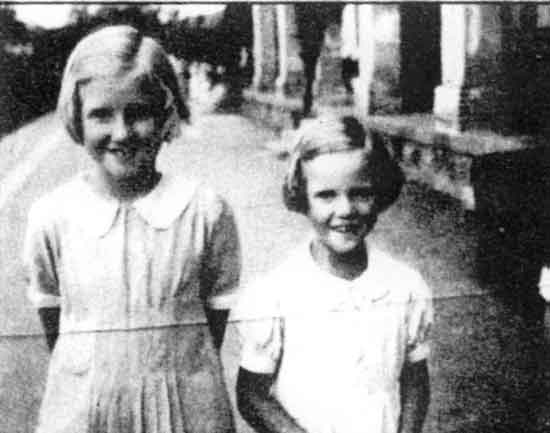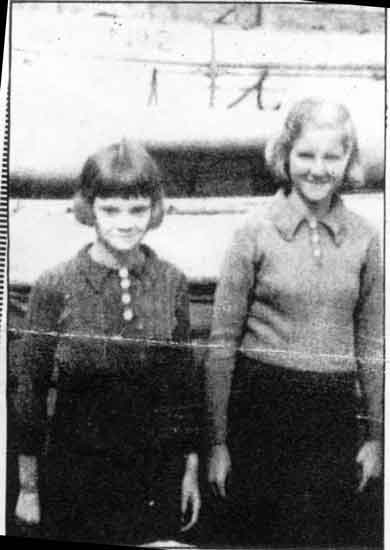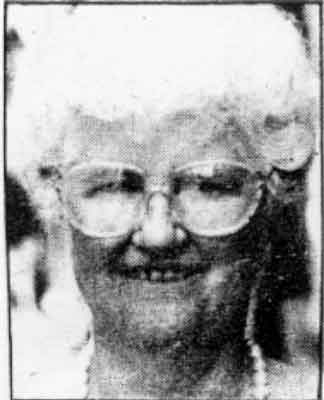At last US soldiers came, I thought I was in heaven
By Paul Kelly
The Mercury, August 12, 1995
• A retired local teacher and daughter of wartime missionary parents recalls her time as a young teenager during the war caught up as a Japanese internee in China.
KATHLEEN Foster celebrated her VJ Day in China - alone without parents in one of the camps where the Japanese had held her prisoner for four years.
Chinese-born Kathleen, then 15, and a former Lichfield schoolteacher, was an internee at the Civil Assembly Centre in Weihsien when US troops took over the camp on August 17, 1945.
She said: "Seven Americans parachuted down and we rushed out to greet them. There was great rejoicing but we had to stay in the camp and wait to be evacuated.”
"We made clothes out of their parachute silk. You can imagine the state of our clothes after being in the camp that long. We had no new clothes only hand-me-downs - we were shoeless in summer.”
Within a month Kathleen moved to the eastern port at Tsingtao and became ill with osteomyelitis, an inflammation of her hip bone caused by infection.
She said: " I was very fortunate because there was a Canadian ship called the BERMUDA with penicillin on board.
"I was the first person in the area to have the drug which was fortunate because without it I'd be on crutches now," she said.
"I was stretchered onto an American ship with a crane. Here I was, I5-years-old clutching a bottle of penicillin and surrounded by US soldiers - I thought I was in heaven," she added.
Kathleen and 12-year-old sister Beryl arrived in England via Hong Kong on December 31, 1945 and saw their mother for the first time in five years.
"Mother had a dreadful war," she said.
"Her husband died in 1941 and her two children were in camps. She had left free China in 1944.
Kathleen's parents were missionaries at the then China Inland Mission at Shensi when Kathleen was born in 1930.
She said: "When I was seven my parents took me to school on the coast. It was over a 1,000 miles away. I did not see them again for three years until they brought my sister."
Parents Arthur and Winifred had sent their daughters to join 400 pupils at Chefoo to receive a Western education while they could complete their missionary work inland.
However in late 1941 events took a different turn when the Japanese began rounding up “alien” westerners and marched into Kathleen's school at Chefoo.
"It was obvious they wanted our buildings because they were good Western buildings. They stuck labels on everything saying 'Property of the Japanese Government'.
"They restricted our going in and out but then in May 1942 we were taken to the other end of town where there were some Western buildings with guards and barbed wire." she said.
"The first lot of guards were quite educated and were gentlemen - but that was the first ten months." she added.
The Japanese then moved Kathleen, the school children and other 'aliens' to the camp at Weihsien where she was held until the end of war.
"They put us on an old British ship but didn't provide any food so we had to get our own. It was three days' journey on a ship with plenty of cockroaches!
"When you were a kid it was very exciting though - we did not have any school or lessons.
"The adults had more to worry about of course but they did not fill our heads with the terror tales that they knew about," she added.
At the camp, a former university, the schoolchildren were put in one large room - with families being housed in single rooms.
"That was until two people escaped so they put us in a hospital building. I slept in the operating room.
"The insects were just ghastly. When we put mosquito nets down it became very hot and bed bugs crawled up to the corners," she said.
One of the escapees, Arthur Hummel, later became US ambassador to China. He gained plenty of respect there for fighting alongside the Chinese in the war.
Onetime athlete Eric Liddell, who refused to run on a Sunday because of his religious beliefs, was also at the camp but died from cancer in early 1945.
The staff and school auxiliaries looked after Kathleen, sister Beryl and the pupils during their four year imprisonment.
"What has affected my life the most was having no parents there and not being the most important person in somebody's life.
"The absence of parents takes quite a slice out of a child's life," she said.
Kathleen also recalls that life for the Japanese guarding and running the Weihsien centre was made harder by the Chinese locals.
She said: "The Japanese were hated by the Chinese. They had their throats cut if they did not have their guns or dogs with them.
"The Japanese were awful to the prisoners of war but they left us alone."
"One 17-year-old boy was killed at roll call in front of his mother when he put his hand up and touched an electric wire - his parents won't look on the camp with the same kind light."
She added: "Until the Italians came there were 1,500 at the camp. The Italians had a separate half because of the ill feeling towards them."
The Japanese banned radios at the camp and often just dumped prisoners' outgoing and incoming mail.
Despite these measures major war news, notably the allies' victory in Europe, did not escape the prisoners - thanks to illicit radios and the grapevine.
"Somebody heard about VE Day on the radio and rang the camp bell to celebrate but this was the same bell the Japanese rang when prisoners escaped.
"They were absolutely furious with us and got the whole camp out in the middle of the night for a roll call."
As the war progressed and the Japanese suffered heavier defeats food in the camp became more scarce.
"The food was ghastly. Everything was bread, bread, bread. We sometimes had meat but we never knew what we were eating.
"We were all very thin by the time we came out - I looked nothing like a 15-year-old girl should look like. I got back here and was put on six weeks of double rations," she said.
Kathleen and sister Beryl docked at Liverpool on December 31, 1945 after a six week voyage from Hong Kong - it was their first time in England.
"When I arrived here I saw a notice which said Beware of Pickpockets - I was horrified because I'd been brought up to think the English did not steal."
Three years later Kathleen went to Goldsmith's School of Art in London alongside miniskirt designer Mary Quant and cult painter Bridget Riley.
"It was quite an exciting time to be there. It was the beginning of new ‘movements'. There was a resurgence and new interest in the arts."
Kathleen set off to Canada in 1954 and returned 10 years later to take up art-teaching at the then Lichfield School of Art.
She retired earlier this year and plans to return to her Chinese birthplace, now renamed Shanxi, which she has not seen since 1937.
Looking back at her time in the camps she realises how fortunate she was - but also knows how despicably the Japanese behaved.
"I don't bear any bitterness but that was that particular camp. I think the Japanese were awful. They despised prisoners because that's how they were brought up.
"I'm just grateful things turned out as they did. It was an exciting time for us as children but the staff protected us from the knowledge which would have caused us to fear."
***
Kathleen's ID badge (she was then Kathleen Strange) in the Camp at Weihsien. She was number 162 in aerea six.
Kathleen (left) with her younger sister Beryl in 1940 before the Japanese marched into their school at Chefoo
Beryl and Kathleen pictured at the Chinese port of Tsingtao after spending nearly four years imprisonned by the Japanese.
"We were all very thin when we came out -- I looked nothing like a 15-year-old should look"
HMS BERMUDA 1939-1965
The Canadian ship in Tsingtao. It carried some of the first penicillin in China and helped Kathleen to recover from a serious infection in her hip.
Kathleen Foster, in 1995



![[click here] #](image/ship.png)
